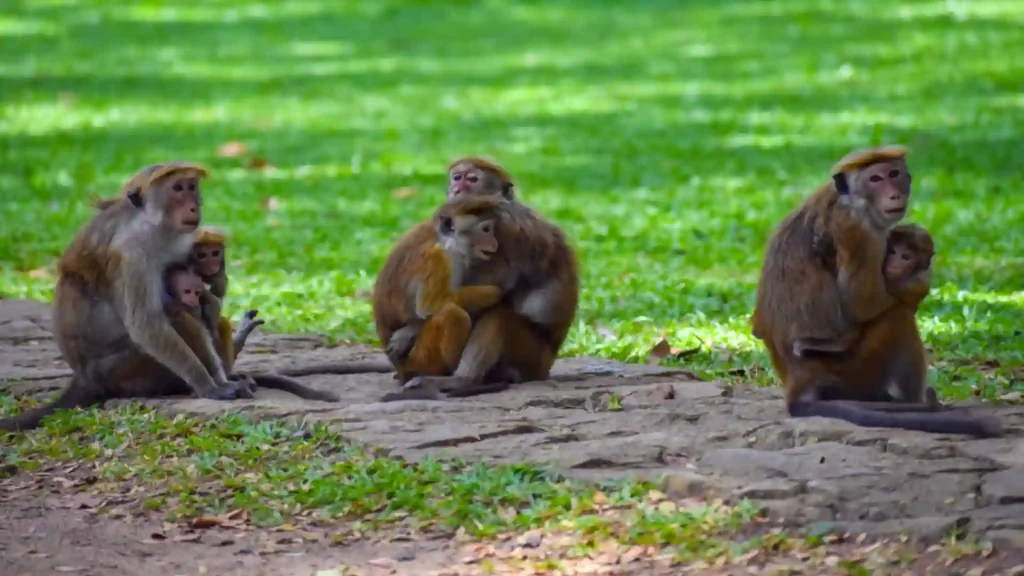Sri Lanka wants to send nearly 100,000 monkeys to Beijing, its largest bilateral lender. These monkeys have ravaged coconuts farms, raided village houses, and hammered common people.
Mahindra Amaraweera, the Minister of Agriculture in Sri Lanka, announced that they are planning to export 1 million “Toque macaque” to China for their hundreds of zoos. He added that a committee had been set up to appropriately assess the proposal and carefully devise a plan for the deal.
Sri Lanka has a 3 million toque macaque monkey population that is making a dent in the agricultural sector. No amount of effort to curb their havoc has been successful. So, Colombo decided to comply with Beijing’s demand to purchase 100,000 monkeys.
This toque macaque monkey is a member of the red list for endangered species published by the International Union for Conservation of Nature.
As per an AFP report, Sri Lanka eliminated the inclusion of monkeys, wild boars, and peacocks from its protected list, enabling the rural human population to go on a killing spree to reduce their population.
Monkey Menace
Monkeys and giant squirrels collectively destroy 100 million coconuts every year, break into houses in search of food and also attack people. The destruction of coconut plantations costs nearly $19.3 (6.638 million Sri Lankan rupees) million in losses for the Sri Lankan agricultural economy, a report by Mongabay said.
Mongabay’s report further said that the damage caused by all other wild animals is estimated to be around $87.5 million. These figures were first published by the Hector Kobbekaduwa Agrarian Research and Training Institute in Colombo.
As per government reports of agriculture devastation caused by wild animals, toque macaques, and giant squirrels destroy coconuts and elephants, and peacocks and wild boars crush paddy fields. It further said that the estimated cost of destroyed produce is $87.5 million (30,215 million Sri Lankan rupees just in the first six months of 2022.
Buddhi Marambe, from the University of Peradeniya’s Faculty of Agriculture, told Mongabay that tackling the destruction of crops by wild animals is not a simple task, and no ready-made solutions are available for implementation. He is a member of the expert committee set up by the Ministry of Agriculture. They are analysing many solutions to the wild animal issue, such as population control, translocations, and sterilisations.
But, Ashoka Dangolla, a veterinary faculty at the University of Peradeniya, stressed that translocations of the animals might not be a good decision and called for sterilisation to control the animal demographics.
Environmental Concern
Environmentalists have warned about the ecological impact of these haphazard measures to control the monkey menace. Monkeys play a pivotal role in the environmental balance that might be disturbed if their population size decreases suddenly.
Dr. Murali Vallipuranathan, an environmentalist, wrote in the ‘Colombo Telegraph’ about the environmental hazards caused by the reduction of the monkey population. He emphasised that the population of toque macaque monkeys does not exceed 200,000, rather than the 300,000 figure being quoted all across the media. So, exporting almost half of them could be disastrous for the environment.
He pointed out that the toque macaque monkeys are seed-dispersing agents for the environment. A drastic change in their numbers will also increase the number of lizards and small birds as they are part of these monkeys’ diet. Alternatively, these monkeys are part of the diet of leopards, pythons, and mugger crocodiles, so a decrease in the availability of monkeys will make these carnivores look for another animal, disturbing the food chain.
Dr. Vallipuranathan added that a feasible solution for the monkey menace is afforestation. Uncontrolled deforestation has led to the destruction of monkeys’ natural habitat, which is now pushing them toward human habitats where they can find food for their survival. After all, humans are the ones who take away everything from them.
Will History Repeat Itself?
Environmentalists fear that such large-scale translocation might trigger an environmental disaster like the devastating starvation caused by the ‘Smash Sparrow campaign in the year 1958. Mao Zedong, the communist leader, thought that sparrows ate a lot of grains, burning a hole in the state’s agricultural income and impacting his larger socio-economic campaign, the Great Leap Forward. So Zedong ordered people to kill sparrows wherever they found them. The total number of killings is estimated to be a few hundred million.
Zedong didn’t realise that although they ate some grains but also ate insects. In the absence of sparrows, insects, especially locusts, grew at an unimaginable rate and swarmed the whole country. They ate almost everything in the fields, leaving nothing for the humans. This brought starvation upon the people so much that humans became cannibals. Scholars estimate starvation deaths from 45 million to as high as 78 million.
“Those who don’t know history are destined to repeat it,” said Edmund Burke, but it need not be reminded to the Sri Lankan authorities. The mistakes of playing with nature’s ecological balance have caused great harm to mankind. The sooner the island nation realises it and takes adequate steps in alignment with nature, the better it will be for the citizens. Lesser coconuts are better than starvation.
